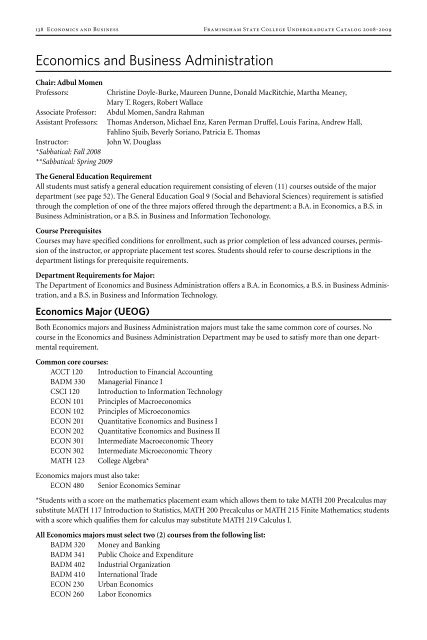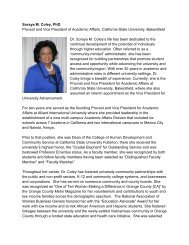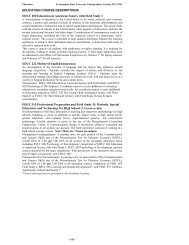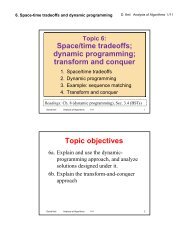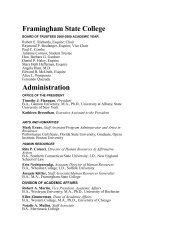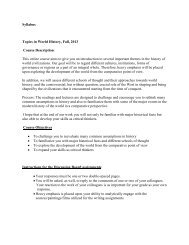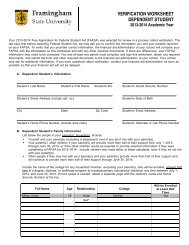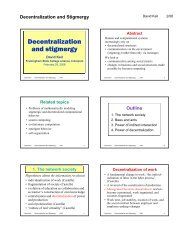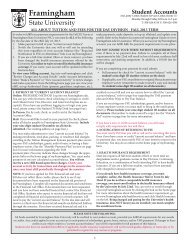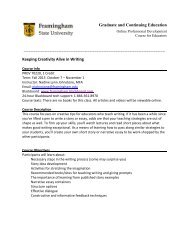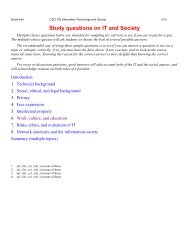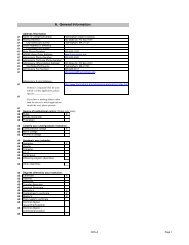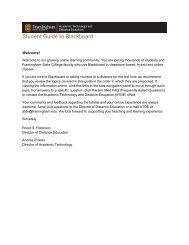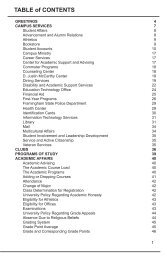Economics and Business Administration - Framingham State ...
Economics and Business Administration - Framingham State ...
Economics and Business Administration - Framingham State ...
Create successful ePaper yourself
Turn your PDF publications into a flip-book with our unique Google optimized e-Paper software.
138 <strong>Economics</strong> <strong>and</strong> <strong>Business</strong><br />
<strong>Economics</strong> <strong>and</strong> <strong>Business</strong> <strong>Administration</strong><br />
<strong>Framingham</strong> <strong>State</strong> College Undergraduate Catalog 2008-2009<br />
Chair: adbul Momen<br />
Professors: Christine Doyle-Burke, Maureen Dunne, Donald MacRitchie, Martha Meaney,<br />
Mary T. Rogers, Robert Wallace<br />
Associate Professor: Abdul Momen, S<strong>and</strong>ra Rahman<br />
Assistant Professors: Thomas Anderson, Michael Enz, Karen Perman Druffel, Louis Farina, Andrew Hall,<br />
Fahlino Sjuib, Beverly Soriano, Patricia E. Thomas<br />
Instructor: John W. Douglass<br />
*Sabbatical: Fall 2008<br />
**Sabbatical: Spring 2009<br />
the general education requirement<br />
All students must satisfy a general education requirement consisting of eleven (11) courses outside of the major<br />
department (see page 52). The General Education Goal 9 (Social <strong>and</strong> Behavioral Sciences) requirement is satisfied<br />
through the completion of one of the three majors offered through the department: a B.A. in <strong>Economics</strong>, a B.S. in<br />
<strong>Business</strong> <strong>Administration</strong>, or a B.S. in <strong>Business</strong> <strong>and</strong> Information Techonology.<br />
Course Prerequisites<br />
Courses may have specified conditions for enrollment, such as prior completion of less advanced courses, permission<br />
of the instructor, or appropriate placement test scores. Students should refer to course descriptions in the<br />
department listings for prerequisite requirements.<br />
department requirements for Major:<br />
The Department of <strong>Economics</strong> <strong>and</strong> <strong>Business</strong> <strong>Administration</strong> offers a B.A. in <strong>Economics</strong>, a B.S. in <strong>Business</strong> <strong>Administration</strong>,<br />
<strong>and</strong> a B.S. in <strong>Business</strong> <strong>and</strong> Information Technology.<br />
<strong>Economics</strong> Major (UEOG)<br />
Both <strong>Economics</strong> majors <strong>and</strong> <strong>Business</strong> <strong>Administration</strong> majors must take the same common core of courses. No<br />
course in the <strong>Economics</strong> <strong>and</strong> <strong>Business</strong> <strong>Administration</strong> Department may be used to satisfy more than one departmental<br />
requirement.<br />
Common core courses:<br />
ACCT 120 Introduction to Financial Accounting<br />
BADM 330 Managerial Finance I<br />
CSCI 120 Introduction to Information Technology<br />
ECON 101 Principles of Macroeconomics<br />
ECON 102 Principles of Microeconomics<br />
ECON 201 Quantitative <strong>Economics</strong> <strong>and</strong> <strong>Business</strong> I<br />
ECON 202 Quantitative <strong>Economics</strong> <strong>and</strong> <strong>Business</strong> II<br />
ECON 301 Intermediate Macroeconomic Theory<br />
ECON 302 Intermediate Microeconomic Theory<br />
MATH 123 College Algebra*<br />
<strong>Economics</strong> majors must also take:<br />
ECON 480 Senior <strong>Economics</strong> Seminar<br />
*Students with a score on the mathematics placement exam which allows them to take MATH 200 Precalculus may<br />
substitute MATH 117 Introduction to Statistics, MATH 200 Precalculus or MATH 215 Finite Mathematics; students<br />
with a score which qualifies them for calculus may substitute MATH 219 Calculus I.<br />
all economics majors must select two (2) courses from the following list:<br />
BADM 320 Money <strong>and</strong> Banking<br />
BADM 341 Public Choice <strong>and</strong> Expenditure<br />
BADM 402 Industrial Organization<br />
BADM 410 International Trade<br />
ECON 230 Urban <strong>Economics</strong><br />
ECON 260 Labor <strong>Economics</strong>
<strong>Framingham</strong> <strong>State</strong> College Undergraduate Catalog 2008-2009 <strong>Economics</strong> <strong>and</strong> <strong>Business</strong> 139<br />
ECON 312 Comparative Economic Systems<br />
ECON 450 History of Economic Thought<br />
economics majors must select an additional two (2) courses from the following list or complete the requirements<br />
of one of the concentrations listed below:<br />
BADM 320 Money <strong>and</strong> Banking<br />
BADM 341 Public Choice <strong>and</strong> Expenditure<br />
BADM 402 Industrial Organization<br />
BADM 410 International Trade<br />
BADM 411 International Finance<br />
BADM 470 Applied Econometrics for <strong>Economics</strong> <strong>and</strong> <strong>Business</strong><br />
ECON 230 Urban <strong>Economics</strong><br />
ECON 260 Labor <strong>Economics</strong><br />
ECON 312 Comparative Economic Systems<br />
ECON 435 Managerial <strong>Economics</strong><br />
ECON 450 History of Economic Thought<br />
Concentrations<br />
Applied Microeconomics (UEOM)<br />
a. required courses:<br />
ECON 435 Managerial <strong>Economics</strong><br />
B. Students choose five (5):<br />
BADM 341 Public Choice <strong>and</strong> Expenditure<br />
BADM 402 Industrial Organization<br />
BADM 410 International Trade<br />
BADM 411 International Finance<br />
BADM 470 Applied Econometrics for <strong>Economics</strong> <strong>and</strong> <strong>Business</strong><br />
ECON 230 Urban <strong>Economics</strong><br />
ECON 260 Labor <strong>Economics</strong><br />
MATH 307 Intermediate Statistics<br />
Quantitative <strong>Economics</strong> (UEOQ)<br />
a. required courses:<br />
MATH 219 Calculus I<br />
MATH 226 Linear Algebra <strong>and</strong> Applications<br />
B. Plus two (2) electives from:<br />
MATH 220 Calculus II<br />
MATH 221 Calculus III<br />
MATH 307 Intermediate Statistics<br />
C. Plus two (2) electives from:<br />
BADM 320 Money <strong>and</strong> Banking<br />
BADM 341 Public Choice <strong>and</strong> Expenditure<br />
BADM 402 Industrial Organization<br />
BADM 410 International Trade<br />
BADM 411 International Finance<br />
BADM 470 Applied Econometrics for <strong>Economics</strong> <strong>and</strong> <strong>Business</strong><br />
ECON 230 Urban <strong>Economics</strong><br />
ECON 260 Labor <strong>Economics</strong><br />
ECON 435 Managerial <strong>Economics</strong><br />
Finance (UEOF)<br />
a. required courses:<br />
ACCT 121 Introduction to Managerial Accounting
140 <strong>Economics</strong> <strong>and</strong> <strong>Business</strong><br />
BADM 320 Money <strong>and</strong> Banking<br />
BADM 431 Managerial Finance II<br />
B. Plus two (2) electives from:<br />
BADM 305 Quantitative Methods in <strong>Business</strong><br />
BADM 411 International Finance<br />
BADM 445 Investments<br />
<strong>Business</strong> (UEOB)<br />
a. required courses:<br />
ACCT 121 Introduction to Managerial Accounting<br />
BADM 280 Applied Organizational Theory <strong>and</strong> Management<br />
MRKT 271 Marketing Principles<br />
B. Plus two (2) electives from:<br />
BADM 215 Legal Environment of <strong>Business</strong><br />
BADM 305 Quantitative Methods in <strong>Business</strong><br />
BADM 320 Money <strong>and</strong> Banking<br />
BADM 402 Industrial Organization<br />
BADM 411 International Finance<br />
BADM 412 International <strong>Business</strong><br />
BADM 428 Taxation<br />
BADM 431 Managerial Finance II<br />
BADM 445 Investments<br />
BADM 470 Applied Econometrics for <strong>Economics</strong> <strong>and</strong> <strong>Business</strong><br />
BADM 485 <strong>Business</strong> Policy <strong>and</strong> Strategy<br />
ECON 260 Labor <strong>Economics</strong><br />
ECON 435 Managerial <strong>Economics</strong><br />
<strong>Business</strong> <strong>Administration</strong> Major (UBAG)<br />
<strong>Framingham</strong> <strong>State</strong> College Undergraduate Catalog 2008-2009<br />
Both <strong>Economics</strong> majors <strong>and</strong> <strong>Business</strong> <strong>Administration</strong> majors must take the same common core courses. <strong>Business</strong><br />
<strong>Administration</strong> majors must also complete a set of core business courses. No course in the <strong>Economics</strong> <strong>and</strong> <strong>Business</strong><br />
<strong>Administration</strong> Department may be used to satisfy more than one departmental requirement.<br />
Common core courses:<br />
ACCT 120 Introduction to Financial Accounting<br />
BADM 330 Managerial Finance I<br />
CSCI 120 Introduction to Information Technology<br />
ECON 101 Principles of Macroeconomics<br />
ECON 102 Principles of Microeconomics<br />
ECON 201 Quantitative <strong>Economics</strong> <strong>and</strong> <strong>Business</strong> I<br />
ECON 202 Quantitative <strong>Economics</strong> <strong>and</strong> <strong>Business</strong> II<br />
ECON 301 Intermediate Macroeconomic Theory<br />
ECON 302 Intermediate Microeconomic Theory<br />
MATH 123 College Algebra*<br />
*Students with a score on the mathematics placement exam which allows them to take MATH 200 Precalculus may<br />
substitute MATH 117 Introduction to Statistics, MATH 200 Precalculus or MATH 215 Finite Mathematics; students<br />
with a score which qualifies them for calculus may substitute MATH 219 Calculus I.<br />
<strong>Business</strong> administration majors must also take:<br />
BADM 485 <strong>Business</strong> Policy <strong>and</strong> Strategy<br />
Core business courses:
<strong>Framingham</strong> <strong>State</strong> College Undergraduate Catalog 2008-2009 <strong>Economics</strong> <strong>and</strong> <strong>Business</strong> 141<br />
ACCT 121 Introduction to Managerial Accounting<br />
BADM 200 Introduction to <strong>Business</strong> Systems<br />
BADM 215 Legal Environment of <strong>Business</strong><br />
BADM 280 Applied Organizational Theory <strong>and</strong> Management<br />
MRKT 271 Marketing Principles<br />
all students majoring in <strong>Business</strong> administration must then either select two (2) electives from the following list<br />
or elect a concentration:<br />
ACCT 326 Cost Accounting<br />
BADM 305 Quantitative Methods in <strong>Business</strong><br />
BADM 313 Promotional Strategy<br />
BADM 320 Money <strong>and</strong> Banking<br />
BADM 371 Marketing Management<br />
BADM 372 Operations <strong>and</strong> Project Management<br />
BADM 375 Sales Management<br />
BADM 381 Human Resource Management<br />
BADM 402 Industrial Organization<br />
BADM 411 International Finance<br />
BADM 412 International <strong>Business</strong><br />
BADM 428 Taxation<br />
BADM 431 Managerial Finance II<br />
BADM 445 Investments<br />
BADM 470 Applied Econometrics for ECON 435 Managerial <strong>Economics</strong> <strong>Economics</strong> <strong>and</strong> <strong>Business</strong><br />
MRKT 310 Marketing Research<br />
MRKT 318 International Marketing<br />
Concentrations<br />
Accounting (UBAA)<br />
required courses:<br />
ACCT 321 Intermediate Accounting I<br />
ACCT 322 Intermediate Accounting II<br />
ACCT 326 Cost Accounting<br />
BADM 428 Taxation<br />
Finance (UBAF)<br />
required courses:<br />
BADM 320 Money <strong>and</strong> Banking<br />
BADM 431 Managerial Finance II<br />
BADM 445 Investments<br />
Plus one (1) elective from:<br />
BADM 305 Quantitative Methods in <strong>Business</strong><br />
BADM 411 International Finance<br />
BADM 474 Topics in Finance<br />
International <strong>Business</strong> (UBAI)<br />
required courses:<br />
BADM 410 International Trade<br />
BADM 411 International Finance<br />
BADM 412 International <strong>Business</strong><br />
Plus one (1) elective from:<br />
ACCT 326 Cost Accounting<br />
BADM 320 Money <strong>and</strong> Banking<br />
BADM 372 Operations <strong>and</strong> Project Management<br />
BADM 402 Industrial Organization<br />
ECON 312 Comparative Economic Systems
142 <strong>Economics</strong> <strong>and</strong> <strong>Business</strong><br />
ECON 435 Managerial <strong>Economics</strong><br />
MRKT 318 International Marketing<br />
Management (UBAT)<br />
required courses:<br />
BADM 372 Operations <strong>and</strong> Project Management<br />
BADM 381 Human Resource Management<br />
Plus two (2) electives from:<br />
ACCT 326 Cost Accounting<br />
BADM 371 Marketing Management<br />
BADM 375 Sales Management<br />
BADM 412 International <strong>Business</strong><br />
BADM 431 Managerial Finance II<br />
Marketing (UBAK)<br />
required courses:<br />
BADM 371 Marketing Management<br />
MRKT 310 Marketing Research<br />
Plus two (2) electives from:<br />
BADM 313 Promotional Strategy<br />
BADM 375 Sales Management<br />
BADM 402 Industrial Organization<br />
BADM 410 International Trade<br />
BADM 412 International <strong>Business</strong><br />
BADM 470 Applied Econometrics for <strong>Economics</strong> <strong>and</strong> <strong>Business</strong><br />
COMM 220 Principles of Mass Communication<br />
ECON 435 Managerial <strong>Economics</strong><br />
MRKT 318 International Marketing<br />
PSYC 207 Psychology of Communication<br />
<strong>Framingham</strong> <strong>State</strong> College Undergraduate Catalog 2008-2009<br />
related Minors<br />
Students majoring in <strong>Economics</strong> or <strong>Business</strong> <strong>Administration</strong> are encouraged but not required to select a minor in<br />
another discipline. A number of minors offered by other departments complement the <strong>Economics</strong> <strong>and</strong> <strong>Business</strong><br />
<strong>Administration</strong> majors <strong>and</strong> enhance the students’ preparation for their individual employment or graduate school<br />
goals. Students should discuss these possibilities with their academic advisors.<br />
<strong>Business</strong> <strong>and</strong> Information Technology Major (UITB)<br />
This major is a collaboration with the <strong>Business</strong> <strong>Administration</strong> <strong>and</strong> Computer Science departments <strong>and</strong> provides<br />
students with knowledge in both the business <strong>and</strong> information technology fields. The intent of this program is to<br />
prepare the <strong>Business</strong> <strong>and</strong> Information Technology program can “bridge the gap” between technology <strong>and</strong> business.<br />
As entry level workers, they are likely to qualify for jobs as systems analysts, Project Management Office administrators,<br />
technical trainers, quality assurance analysts <strong>and</strong> similar roles. As experienced workers, they are likely to move<br />
into Project Management, Delivery Assurance <strong>and</strong> IT Management roles.<br />
required <strong>Business</strong> core courses (13):<br />
ACCT 120 Introduction to Financial Accounting<br />
ACCT 121 Introduction to Managerial<br />
BADM 215 Legal Environment of <strong>Business</strong><br />
BADM 280 Applied Organizational Theory <strong>and</strong> Management<br />
BADM 330 Managerial Finance I<br />
BADM 372 Operations <strong>and</strong> Project Management<br />
BADM 385 <strong>Business</strong> Systems Analysis <strong>and</strong> Design<br />
BADM 477 Management Issues in Information<br />
ECON 101 Principles of Macroeconomics
<strong>Framingham</strong> <strong>State</strong> College Undergraduate Catalog 2008-2009 <strong>Economics</strong> <strong>and</strong> <strong>Business</strong> 143<br />
ECON 102 Principles of MicroeconomicsAccounting<br />
ECON 201 Quantitative <strong>Economics</strong> <strong>and</strong> <strong>Business</strong> I<br />
ECON 202 Quantitative <strong>Economics</strong> <strong>and</strong> <strong>Business</strong> II<br />
MRKT 271 Marketing Principles Technology<br />
required Computer Science core courses (6):<br />
CSCI 108 HTML, JavaScript Programming, <strong>and</strong> Web Site Development<br />
CSCI 120 Introduction to Information Technology<br />
CSCI 152 Computer Science I Using Java<br />
CSCI 258 Introduction to Operating Systems Using UNIX<br />
CSCI 360 Database Management<br />
CSCI 376 Networking Technologies<br />
Minor in <strong>Economics</strong> (5 Courses)<br />
economics minor is not open to <strong>Business</strong> administration majors.<br />
required Courses:<br />
ECON 101 Principles of Macroeconomics<br />
ECON 102 Principles of Microeconomics<br />
Plus three (3) electives with at least two at the 200-level or above from:<br />
BADM 320 Money <strong>and</strong> Banking<br />
BADM 341 Public Choice <strong>and</strong> Expenditure<br />
BADM 402 Industrial Organization<br />
BADM 410 International Trade<br />
BADM 411 International Finance<br />
BADM 470 Applied Econometrics for <strong>Economics</strong> <strong>and</strong> <strong>Business</strong><br />
CONS 210 Consumer <strong>Economics</strong><br />
ECON 100 Contemporary Economic Problems <strong>and</strong> Issues<br />
ECON 105 An Introduction to the United <strong>State</strong>s Economy<br />
ECON 201 Quantitative <strong>Economics</strong> <strong>and</strong> <strong>Business</strong> I<br />
ECON 202 Quantitative <strong>Economics</strong> <strong>and</strong> <strong>Business</strong> II<br />
ECON 230 Urban <strong>Economics</strong><br />
ECON 260 Labor <strong>Economics</strong><br />
ECON 301 Intermediate Macroeconomic Theory<br />
ECON 302 Intermediate Microeconomic Theory<br />
ECON 312 Comparative Economic Systems<br />
ECON 435 Managerial <strong>Economics</strong><br />
ECON 450 History of Economic Thought<br />
Minor in <strong>Business</strong> (5 Courses)<br />
the <strong>Business</strong> minor is not open to economics majors.<br />
Students must select five (5) courses from a minimum of four (4) of the areas listed below. At least one (1) of the<br />
courses must be from economics.<br />
economics:<br />
ECON 101 Principles of Macroeconomics<br />
ECON 102 Principles of Microeconomics<br />
accounting:<br />
ACCT 120 Introduction to Financial Accounting<br />
ACCT 121 Introduction of Managerial Accounting<br />
Marketing:<br />
MRKT 271 Marketing Principles<br />
Management:<br />
BADM 280 Applied Organizational Theory <strong>and</strong> Management<br />
BADM 381 Human Resource Management
144 <strong>Economics</strong> <strong>and</strong> <strong>Business</strong><br />
Finance:<br />
BADM 320 Money <strong>and</strong> Banking<br />
BADM 330 Managerial Finance I<br />
law:<br />
BADM 215 Legal Environment of <strong>Business</strong><br />
Minor in Information Technology<br />
(See Page 47)<br />
<strong>Framingham</strong> <strong>State</strong> College Undergraduate Catalog 2008-2009<br />
<strong>Economics</strong> Courses Appropriate for General Education (Gen. Ed.)<br />
Courses: Goal<br />
ECON 101 Principles of Macroeconomics 10<br />
ECON 102 Principles of Microeconomics 9<br />
Accounting Course Descriptions<br />
Subject<br />
Code<br />
Course<br />
Number<br />
Course<br />
Description<br />
aCCt 120 Introduction to Financial accounting<br />
A study of financial accounting <strong>and</strong> accounting systems starting with the accounting cycle<br />
<strong>and</strong> going through the preparation <strong>and</strong> interpretation of financial statements for all types<br />
of business entities. Topics covered include generally accepted accounting principles, the<br />
theory of accounts, <strong>and</strong> the theory of present value as it relates to financial accounting<br />
problems. Note: Credit will not be given for both this course <strong>and</strong> 12.220 Introduction to<br />
Financial Accounting.<br />
aCCt 121 Introduction to Managerial accounting<br />
A study of the essentials of managerial accounting focusing on the use of accounting<br />
information in the decision-making process. Topics covered include planning, budgeting,<br />
control, <strong>and</strong> valuation. Note: Credit will not be given for both this course <strong>and</strong> 12.221<br />
Introduction to Managerial Accounting.<br />
aCCt 321 Intermediate accounting I<br />
An intensive study of generally accepted accounting principles dealing with balance<br />
sheet evaluations <strong>and</strong> their effect on income determination. Topics include applications<br />
of present value techniques to accounting, valuation <strong>and</strong> reporting of cash, receivables,<br />
short-term investments, inventories, fixed assets <strong>and</strong> intangible assets. Prerequisite: ACCT<br />
121 Introduction to Managerial Accounting.<br />
aCCt 322 Intermediate accounting II<br />
Additional topics in financial accounting, including an in-depth analysis of current <strong>and</strong><br />
long-term liabilities, capital stock, options <strong>and</strong> warrants, earnings-per-share calculations,<br />
convertible securities, retained earnings <strong>and</strong> dividends, <strong>and</strong> statement of changes in financial<br />
position. Also studied are income-tax allocations, pension accounting, <strong>and</strong> accounting<br />
for lease transactions. Prerequisite: ACCT 321 Intermediate Accounting I.
<strong>Framingham</strong> <strong>State</strong> College Undergraduate Catalog 2008-2009 <strong>Economics</strong> <strong>and</strong> <strong>Business</strong> 145<br />
aCCt 121 Cost accounting<br />
A treatment of presentation <strong>and</strong> analysis of data to facilitate decision-making in the<br />
organization. Topics covered include cost evaluation, forecasting, variance analysis, cost<br />
structures, cost behavior patterns, break-even analysis, <strong>and</strong> capital budgeting. Prerequisite:<br />
ACCT 121 Introduction to Managerial Accounting.<br />
<strong>Business</strong> Adminstration Course Descriptions<br />
BadM 200 Introduction to <strong>Business</strong> Systems<br />
An introductory study of information systems from a business problem-solving perspective.<br />
Topics include technical <strong>and</strong> organizational foundations of information systems,<br />
the use of information systems to support critical business operations <strong>and</strong> to achieve<br />
strategic objectives, common approaches to building information systems, <strong>and</strong> management<br />
of information system resources. The course emphasizes the use of computers to<br />
analyze, coordinate, <strong>and</strong> solve organizational decision-making problems. Note: Students<br />
may not receive credit for both BADM 200 Introduction to <strong>Business</strong> Systems <strong>and</strong> 12.208<br />
Microcomputer Applications in <strong>Business</strong>. Prerequisite: CSCI 120 Introduction to Information<br />
Technology.<br />
BadM 215 legal environment of <strong>Business</strong><br />
A study of the interrelationships among business, government, <strong>and</strong> society as reflected in<br />
the legal system in which firms operate. In addition to examining specific laws <strong>and</strong> legal<br />
issues, such as business transactions, employer-employee relations, government regulation<br />
<strong>and</strong> consumer law, students become familiar with the way in which laws develop <strong>and</strong><br />
change. Special emphasis is on the social <strong>and</strong> ethical issues which arise in business law.<br />
BadM 280 applied organizational theory <strong>and</strong> Management<br />
An in-depth study of the application of management theory to the behavior of individuals<br />
<strong>and</strong> groups in organizations. Topics in the course include: organizational structure <strong>and</strong><br />
design, motivation, job design, leadership, communication <strong>and</strong> power in organizations.<br />
Prerequisite: Sophomore st<strong>and</strong>ing.<br />
BadM 305 Quantitative Methods in <strong>Business</strong><br />
The application of quantitative techniques to solve organizational problems. Topics<br />
covered include decision theory <strong>and</strong> models, analysis of risk, network analysis, linear<br />
programming, <strong>and</strong> the application of these topics through the use of problems <strong>and</strong> case<br />
analysis. Prerequisite: ECON 202 Quantitative <strong>Economics</strong> <strong>and</strong> <strong>Business</strong> II, MRKT 271 Marketing<br />
Principles, <strong>and</strong> BADM 280 Applied Organizational Theory <strong>and</strong> Management.<br />
BadM 313 Promotional Strategy<br />
A focus on the development of effective marketing communication strategies. Various aspects<br />
of marketing communication are discussed, including advertising, sales promotion,<br />
personal selling, <strong>and</strong> public relations. Prerequisite: MRKT 271 Marketing Principles<br />
BadM 320 Money <strong>and</strong> Banking<br />
A survey of the development of money <strong>and</strong> credit, monetary theories, monetary systems<br />
<strong>and</strong> an examination of the relationship between monetary policy <strong>and</strong> economic welfare.<br />
Prerequisite: ECON 101 Principles of Macroeconomics <strong>and</strong> ECON 102 Principles of<br />
Microeconomics.
146 <strong>Economics</strong> <strong>and</strong> <strong>Business</strong><br />
<strong>Framingham</strong> <strong>State</strong> College Undergraduate Catalog 2008-2009<br />
BadM 330 Managerial Finance I<br />
The study of the relationship between the investment <strong>and</strong> financing decisions made by<br />
firms. Main topics include working capital <strong>and</strong> fixed asset management contained within<br />
a broad overview of the type of assets a company acquires, the reasons for acquiring<br />
them, <strong>and</strong> the sources <strong>and</strong> costs of financing the assets. Concepts are discussed primarily<br />
in accounting terms, <strong>and</strong> mathematical relationships are used as a focal point for<br />
discussion. Prerequisite: ECON 101 Principles of Macroeconomics, ECON 102 Principles<br />
of Microeconomics, <strong>and</strong> ACCT 120 Introduction to Financial Accounting, <strong>and</strong> ECON 202<br />
Quantitative <strong>Economics</strong> <strong>and</strong> <strong>Business</strong> II (or concurrent registration).<br />
BadM 341 Public Choice <strong>and</strong> expenditure<br />
An introduction to the process of social choice <strong>and</strong> the translation of choice into public<br />
expenditure programs. Emphasis is placed upon the application of economic analysis in<br />
the appraisal of income redistribution, health, education, defense, social insurance, <strong>and</strong><br />
environmental programs. Note: Credit will not be given for both this course <strong>and</strong> 12.340<br />
Public Finance. Prerequisite: ECON 101 Principles of Macroeconomics <strong>and</strong> ECON 102<br />
Principles of Microeconomics.<br />
BadM 372 operations <strong>and</strong> Project Management<br />
An analysis of methods to effectively produce <strong>and</strong> distribute goods <strong>and</strong> services provided<br />
by profit <strong>and</strong> nonprofit organizations. Topics to be covered include project management,<br />
process selection <strong>and</strong> design, production planning <strong>and</strong> control, quality control, prices<br />
<strong>and</strong> costs, <strong>and</strong> the technology of materials <strong>and</strong> equipment. Prerequisite: ECON 202<br />
Quantitative <strong>Economics</strong> <strong>and</strong> <strong>Business</strong> II <strong>and</strong> BADM 280 Applied Organizational Theory <strong>and</strong><br />
Management.<br />
BadM 375 Sales Management<br />
An examination of the importance of personal selling <strong>and</strong> distribution. The course focuses<br />
on recruiting, organizing, <strong>and</strong> motivating the sales force; forecasting; budgeting; selling;<br />
control; <strong>and</strong> cooperation with channel distribution members. Prerequisites: MRKT 271<br />
Marketing Principles <strong>and</strong> BADM 280 Applied Organizational Theory <strong>and</strong> Management.<br />
BadM 381 Human resource Management<br />
A study of the personnel function within profit <strong>and</strong> non-profit organizations. The course<br />
covers the procurement, development, compensation, integration <strong>and</strong> maintenance of<br />
personnel. Prerequisite: BADM 280 Applied Organizational Theory <strong>and</strong> Management.<br />
BadM 385 <strong>Business</strong> Systems analysis <strong>and</strong> design<br />
An introduction to the fundamental concepts used in the implementation of information<br />
systems in a business organization. Topics include systems concepts <strong>and</strong> thinking, business<br />
process analysis, <strong>and</strong> common business models for systems development life cycle, as well<br />
as additional topics, such as project management methodology <strong>and</strong> team approaches,<br />
<strong>and</strong> technology integration concerns. Prerequisites: CSCI 376 Networking Technologies (or<br />
concurrent registration), ACCT 121 Introduction to Managerial Accounting, BADM 280<br />
Applied Organizational Theory <strong>and</strong> junior st<strong>and</strong>ing.<br />
BadM 402 Industrial organization<br />
A survey of the market structure, conduct, <strong>and</strong> performance of American industry.<br />
Consideration is given to the rationale <strong>and</strong> effectiveness of anti- trust policy <strong>and</strong> related<br />
problems <strong>and</strong> issues. Prerequisite: ECON 302 Intermediate Microeconomic Theory.
<strong>Framingham</strong> <strong>State</strong> College Undergraduate Catalog 2008-2009 <strong>Economics</strong> <strong>and</strong> <strong>Business</strong> 147<br />
BadM 410 International trade<br />
An analysis of the foundations <strong>and</strong> principles of international trade. Specific topics<br />
include: comparative advantage, terms of trade, factor movements, tariffs <strong>and</strong><br />
protectionism. Prerequisite: ECON 101 Principles of Macroeconomics <strong>and</strong> ECON 102<br />
Principles of Microeconomics.<br />
BadM 411 International Finance<br />
An analysis of the monetary aspects of international trade <strong>and</strong> balance of payments<br />
adjustment mechanisms. Some specific topics include: the International Monetary Fund,<br />
multi-national corporations, foreign exchange transfers. Prerequisite: ECON 101 Principles<br />
of Macroeconomics <strong>and</strong> ECON 102 Principles of Microeconomics.<br />
BadM 412 International <strong>Business</strong><br />
A study of the complexity of managing an organization with international interests. Topics<br />
discussed include political, economic, <strong>and</strong> cultural environments; developing planning<br />
systems <strong>and</strong> strategies to ensure international competence in finance, marketing, human<br />
resources, production, <strong>and</strong> societal response in an international setting. Cases may be<br />
used to help develop skills in the above area. Prerequisite: MRKT 271 Marketing Principles,<br />
BADM 280 Applied Organizational Theory <strong>and</strong> Management, <strong>and</strong> BADM 330 Managerial<br />
Finance I.<br />
BadM 428 taxation<br />
A broad introduction to federal income tax law <strong>and</strong> preparation. Covered in detail is<br />
the taxation of individuals including taxable income determinations, deductions, <strong>and</strong><br />
gain or loss on exchange of property. The course also introduces taxation issues faced<br />
by corporations <strong>and</strong> partnerships. Prerequisite: ACCT 121 Introduction to Managerial<br />
Accounting.<br />
BadM 431 Managerial Finance II<br />
The study of the theory <strong>and</strong> application of the basic principles underlying the relationship<br />
between the long-run investment <strong>and</strong> financing decisions made by the firm. Included are<br />
the seminal theoretical foundations of Modigliani <strong>and</strong> Miller, as well as the use of CAPM<br />
<strong>and</strong> APT in capital budgeting <strong>and</strong> cost of capital. Application of the basic principles is<br />
accomplished using the case method. Prerequisite: BADM 330 Managerial Finance I.<br />
BadM 445 Investments<br />
The study of the process whereby investors choose individual securities <strong>and</strong> combine<br />
them into portfolios. The major topics are the fundamentals of security analysis, including<br />
the instruments <strong>and</strong> the markets for securities, <strong>and</strong> the basics of portfolio analysis from<br />
Markowitz to APT. A discussion of derivative securities is also included. Mathematical<br />
descriptions of financial instruments <strong>and</strong> portfolios are widely employed. Prerequisite:<br />
BADM 330 Managerial Finance I.<br />
BadM 470 applied econometrics for economics <strong>and</strong> <strong>Business</strong><br />
A continuation of the material presented in Quantitative <strong>Economics</strong> <strong>and</strong> <strong>Business</strong> II,<br />
concentrating on the application of these tools to the analysis of economics <strong>and</strong> business<br />
data. The course covers classical linear regression techniques (both simple <strong>and</strong> multiple<br />
regression) with emphasis placed on the necessary modifications to these procedures for<br />
use in economic <strong>and</strong> business applications. Topics covered include heteroskedasticity,<br />
auto-correlation, non-linear estimation, errors in variables, multicollinearity, dummy<br />
variables, distributed lags <strong>and</strong> simultaneous equation systems. Students use the computer<br />
to apply these concepts to actual data. Prerequisite: ECON 202 Quantitative <strong>Economics</strong> <strong>and</strong><br />
<strong>Business</strong> II or permission of the department chair.
148 <strong>Economics</strong> <strong>and</strong> <strong>Business</strong><br />
<strong>Framingham</strong> <strong>State</strong> College Undergraduate Catalog 2008-2009<br />
BadM 474 topics in Finance<br />
An in-depth evaluation of the current trends <strong>and</strong> changes that are occurring in finance<br />
from the perspective of both the investor <strong>and</strong> the firm. The study involves student<br />
application of techniques derived from the evolutionary changes that are being made<br />
in financial management <strong>and</strong> investment analysis. The focus is on capital planning <strong>and</strong><br />
asset portfolio formation. Case studies <strong>and</strong> projects outside the classroom are utilized.<br />
Prerequisite: BADM 431 Managerial Finance II.<br />
BadM 477 Management Issues in Information technology<br />
An examination of the management issues related to the implementation, evaluation<br />
<strong>and</strong> control of information technology in business from planning <strong>and</strong> pre-sales to<br />
development, implementation <strong>and</strong> maintenance. The course focuses on application of<br />
project management procedures <strong>and</strong> common business models for evaluation <strong>and</strong> control.<br />
The course approach includes case studies <strong>and</strong>/or group projects done in collaboration<br />
with industry. Course topics include software <strong>and</strong> hardware evaluation, security <strong>and</strong><br />
regulatory issues, <strong>and</strong> IT audits <strong>and</strong> assessment. Other topics may include strategic use<br />
of technology, technology-based alliances, ethical issues related to the Internet, project<br />
justification, ROI requirements <strong>and</strong> cost/benefit analysis, vendor relationships, service<br />
level agreements, licensing issues, project planning <strong>and</strong> control, outsourcing approaches,<br />
<strong>and</strong> IT maintenance. Prerequisite: BADM 385 <strong>Business</strong> Systems Analysis <strong>and</strong> Design <strong>and</strong><br />
senior st<strong>and</strong>ing.<br />
BadM 485 <strong>Business</strong> Policy <strong>and</strong> Strategy<br />
An examination of the formulation of corporate strategy in business enterprises with<br />
emphasis on the economic, political, <strong>and</strong> social influences on strategy. The course focuses<br />
o application of corporate planning tools <strong>and</strong> analysis of the general manager tasks as an<br />
implementer of corporate strategy. Problems which affect the character <strong>and</strong> success of the<br />
total enterprise are examined. Cases are drawn from companies of various sizes in various<br />
industries. This course is open only to senior <strong>Business</strong> <strong>Administration</strong> majors or to others<br />
by permission of the instructor. Prerequisite: ACCT 121 Managerial Accounting, MRKT<br />
271 Marketing Principles, BADM 280 Applied Organizational Theory <strong>and</strong> Management, <strong>and</strong><br />
BADM 330 Managerial Finance I.<br />
BadM 490 Independent Study in <strong>Business</strong> administration<br />
Under the direction of a faculty member, the student pursues reading <strong>and</strong> research on a<br />
selected topic in economics. Prerequisite: Permission of the instructor.<br />
BadM 495/496 Internship in economics <strong>and</strong> <strong>Business</strong> administration<br />
A supervised practical experience in a public or private organization appropriate to the<br />
student’s program of study. Before registering for the internship the student must submit<br />
a proposal outlining the internship <strong>and</strong> showing how it integrates with the student’s<br />
academic program. The internship requires written documentation of the student’s<br />
experiences <strong>and</strong> a research project or critical evaluation of the experience. Students may<br />
earn up to four (4) course credits. The internship is not intended to satisfy or substitute<br />
for any of the courses required for the major. Prerequisite: A minimum of 3.0 QPA overall<br />
<strong>and</strong> 3.2 in department courses <strong>and</strong> approval of the internship supervisor. The grade point<br />
requirement may be waived at the discretion of the intern’s internship supervisor.
<strong>Framingham</strong> <strong>State</strong> College Undergraduate Catalog 2008-2009 <strong>Economics</strong> <strong>and</strong> <strong>Business</strong> 149<br />
<strong>Economics</strong> Course Descriptions<br />
eCon 100 Contemporary economic Problems <strong>and</strong> Issues<br />
A discussion of current local, national, <strong>and</strong> international issues using economic analysis<br />
as a method to underst<strong>and</strong> the causes <strong>and</strong> implications of social phenomena. A relatively<br />
brief introduction to the basic tools of economic theory is given. Students then learn<br />
to apply these tools to such issues as the distribution of income <strong>and</strong> the prevalence of<br />
poverty in society, the role discrimination plays in the economy, the U.S. position in the<br />
world economy, the economic consequences of changing demographics, the market for<br />
illegal drugs, the growing national debt, <strong>and</strong> other issues pertinent to the semester in<br />
which the course is taught. This course does not satisfy either the <strong>Economics</strong> or <strong>Business</strong><br />
<strong>Administration</strong> major.<br />
eCon 101 Principles of Macroeconomics (gen. ed. goal 10)<br />
The study of the U.S. free enterprise system <strong>and</strong> its place in the global economy. After<br />
a consideration of basic economy concepts, the student is introduced to the forces that<br />
determine national income, employment, recession, inflation, <strong>and</strong> economic growth.<br />
Monetary <strong>and</strong> fiscal policy options are analyzed with emphasis on the economic, social,<br />
<strong>and</strong> political consequences.<br />
eCon 102 Principles of Microeconomics (gen. ed. goal 9)<br />
An introduction to the behavior of individual decision makers, particularly consumers<br />
<strong>and</strong> firms, who must make choices under conditions of economic scarcity. The course<br />
focuses on how markets work to allocate resources, how households maximize their<br />
satisfaction from consumer opportunities subject to an income constraint, <strong>and</strong> how<br />
firms organize production <strong>and</strong> measure costs in order to maximize profits. Related topics<br />
include comparative advantage <strong>and</strong> trade, competition <strong>and</strong> monopoly, government<br />
regulation, <strong>and</strong> labor markets.<br />
eCon 105 an Introduction to the united <strong>State</strong>s economy<br />
An overview of the structure of the U.S. economy that provides an underst<strong>and</strong>ing of<br />
how it functions. Students are first introduced to the discipline of economics <strong>and</strong> to<br />
some of the basic theoretical tools which economists use to analyze economic activity, to<br />
underst<strong>and</strong> how markets function, <strong>and</strong> how a market system allocates economic resources.<br />
These tools are then used to analyze the various parts of the U.S. economy: product,<br />
labor, <strong>and</strong> financial markets; the influence of international forces; the economic role of<br />
the government. During this process data are presented to give students an appreciation<br />
for the size of the economy <strong>and</strong> its sectors. Current economic issues are analyzed <strong>and</strong><br />
discussed placing special emphasis on how social, political, geographic, <strong>and</strong> other forces<br />
impact those issues. This course does not satisfy any of the requirements for either the<br />
<strong>Business</strong> <strong>Administration</strong> or the <strong>Economics</strong> major.<br />
eCon 201 Quantitative economics <strong>and</strong> <strong>Business</strong> I<br />
A survey of the mathematical skills needed for upper division courses in economics <strong>and</strong><br />
business. Emphasis is placed on the use of mathematical models to describe relationships<br />
in business <strong>and</strong> economics. Topics covered include mathematical functions, cost functions,<br />
the consumption function, systems of equations, market models, the Keynesian income<br />
determination model, matrix algebra, input-output analysis, differential <strong>and</strong> integral<br />
calculus, marginal analysis, <strong>and</strong> profit <strong>and</strong> utility maximization. Prerequisite: ECON 101<br />
Principles of Macroeconomics, ECON 102 Principles of Microeconomics, MATH 123 College<br />
Algebra, or permission of the instructor.
150 <strong>Economics</strong> <strong>and</strong> <strong>Business</strong><br />
<strong>Framingham</strong> <strong>State</strong> College Undergraduate Catalog 2008-2009<br />
eCon 202 Quantitative economics <strong>and</strong> <strong>Business</strong> II<br />
An introduction to the basic techniques of descriptive <strong>and</strong> inferential statistics as<br />
applied to the decision-making process in business <strong>and</strong> economics. Emphasis is placed<br />
on estimation <strong>and</strong> forecasting techniques. Topics covered include measures of central<br />
tendency <strong>and</strong> dispersion, index numbers, probability, regression analysis <strong>and</strong> economic<br />
forecasting. Prerequisite: ECON 201 Quantitative <strong>Economics</strong> <strong>and</strong> <strong>Business</strong> I.<br />
eCon 230 urban economics<br />
An application of basic economic theory to the task of underst<strong>and</strong>ing the process of<br />
urbanization, the growth <strong>and</strong> decline of cities, <strong>and</strong> the spatial location of economic<br />
activity within metropolitan areas. Also examined are the specific urban problems of<br />
poverty, housing, local finance, <strong>and</strong> transportation. Prerequisite: ECON 101 Principles of<br />
Macroeconomics <strong>and</strong> ECON 102 Principles of Microeconomics.<br />
eCon 260 labor economics<br />
An analysis of the nature of the job market. Some topics considered include:<br />
unemployment, wages, occupational choice, changing role of women, hiring st<strong>and</strong>ards,<br />
<strong>and</strong> relevancy in education programs. Discussion focuses on how society educates <strong>and</strong><br />
trains its human resources for their entry <strong>and</strong> re-entry into productive employment.<br />
Prerequisite: ECON 101 Principles of Macroeconomics <strong>and</strong> ECON 102 Principles of<br />
Microeconomics.<br />
eCon 290/390 topics in economics <strong>and</strong> <strong>Business</strong><br />
Selected topics in an area of economics or business offered on occasion at the discretion of<br />
the department. Determination of where the course fits in the academic program will be<br />
made on a case-by-case basis. Prerequisite: Case-by-case or permission of instructor.<br />
eCon 301 Intermediate Macroeconomic theory<br />
An in-depth analysis of the static <strong>and</strong> dynamic theories of aggregate economic behavior;<br />
determinants of consumption, investment, the dem<strong>and</strong> for money, <strong>and</strong> economic<br />
growth. Prerequisite: ECON 101 Principles of Macroeconomics <strong>and</strong> ECON 102 Principles of<br />
Microeconomics.<br />
eCon 302 Intermediate Microeconomic theory<br />
An in-depth analysis of the theory of consumer behavior, the firm <strong>and</strong> the industry, <strong>and</strong><br />
the pricing of the factors of production; general equilibrium analysis, <strong>and</strong> an introduction<br />
to welfare economics. Prerequisite: ECON 101 Principles of Macroeconomics <strong>and</strong> ECON 102<br />
Principles of Microeconomics.
<strong>Framingham</strong> <strong>State</strong> College Undergraduate Catalog 2008-2009 <strong>Economics</strong> <strong>and</strong> <strong>Business</strong> 151<br />
eCon 312 Comparative economic Systems<br />
A study of the different systems societies use to organize economic activity. The course<br />
covers the historical development of theories of capitalism, socialism, market socialism<br />
<strong>and</strong> communism, <strong>and</strong> compares these theoretical models. Considerable time is then spent<br />
analyzing how these systems work in practice by examining real-world examples of each.<br />
The relationship between the economic system <strong>and</strong> the social, cultural, historical <strong>and</strong>/or<br />
political forces in these nations is emphasized. Comparisons are made not only between<br />
nations that employ different systems, but also between nations that use variations of the<br />
same type of system. The course also examines the economics of transition from one type<br />
of system to another. Prerequisites: ECON 101 Principles of Macroeconomics <strong>and</strong> ECON 102<br />
Principles of Microeconomics.<br />
eCon 435 Managerial economics<br />
An application of the analytical tools of microeconomics to solving business problems.<br />
Topics included are criteria for business decisions, pricing <strong>and</strong> promotion decisions;<br />
expenditure, cost, <strong>and</strong> production decisions; the estimation of production costs <strong>and</strong><br />
consumer dem<strong>and</strong>; <strong>and</strong> the estimation of the cost of capital <strong>and</strong> investment decisions.<br />
Prerequisite: ECON 101 Principles of Macroeconomics <strong>and</strong> ECON 102 Principles of<br />
Microeconomics.<br />
eCon 450 History of economic thought<br />
The historical development of classical economics from its origin in the works of the<br />
schoolmen <strong>and</strong> Physiocracy to its culmination in A. Smith, <strong>and</strong> nineteenth century<br />
English liberalism. The criticism of classical tenets by writers like Malthus <strong>and</strong> Marx<br />
are evaluated. The neoclassical economics of Marshall <strong>and</strong> Pigou are developed from<br />
both Austrian <strong>and</strong> English marginalism. Keynesian Macroeconomics is developed <strong>and</strong><br />
evaluated in the context of contemporary economic developments. Prerequisite: ECON<br />
301 Intermediate Macroeconomic Theory <strong>and</strong> ECON 302 Intermediate Microeconomic<br />
Theory, or permission of the instructor.<br />
eCon 480 Senior economics Seminar<br />
A seminar designed to afford advanced economics students an opportunity to integrate<br />
their studies in an open problem-solving format. The specific topics are developed<br />
according to the interests <strong>and</strong> needs of the participants. Prerequisite: Permission of the<br />
instructor.<br />
eCon 496 Internship-Consumer economic Problems<br />
Selected current problems at the state <strong>and</strong> local levels. Students examine these problems<br />
under the direction of representatives from consumer organizations, such as the<br />
Massachusetts Consumer Association <strong>and</strong> the Consumer Protection Division of the<br />
Attorney General’s Office. Prerequisite: CONS 210 Consumer <strong>Economics</strong>.<br />
Marketing Course Descriptions<br />
MrKt 271 Marketing Principles<br />
An examination of marketing functions, the activities of producers, wholesalers, retailers<br />
<strong>and</strong> other middlemen, the channels of distribution, integration of the marketing<br />
functions, price policies <strong>and</strong> government regulation. Special emphasis is given to the<br />
aspect of marketing management. Prerequisite: ECON 101 Principles of Macroeconomics<br />
<strong>and</strong> ECON 102 Principles of Microeconomics.
152 Education<br />
<strong>Framingham</strong> <strong>State</strong> College Undergraduate Catalog 2008-2009<br />
MrKt 310 Marketing research<br />
A coverage of the fundamentals of the market research process <strong>and</strong> how marketing<br />
research is used to solve marketing problems. Topics include research design, data<br />
collection <strong>and</strong> analysis techniques, <strong>and</strong> interpretation <strong>and</strong> implementation of research<br />
findings. Prerequisite: MRKT 271 Marketing Principles <strong>and</strong> ECON 202 Quantitative<br />
<strong>Economics</strong> <strong>and</strong> <strong>Business</strong> II, or permission of the instructor.<br />
MrKt 318 International Marketing<br />
An examination of the opportunities <strong>and</strong> challenges facing business organizations in<br />
international markets. Topics include the international marketing process, the importance<br />
of effective international marketing communication, <strong>and</strong> the formation <strong>and</strong> execution<br />
of international marketing strategies. Special emphasis is placed on cultural, social, legal,<br />
political, <strong>and</strong> organizational forces that influence international marketing operations.<br />
Prerequisite: MRKT 271 Marketing Principles<br />
MrKt 371 Marketing Management<br />
An introduction to market research <strong>and</strong> analysis. The course focuses on the design <strong>and</strong><br />
implementation of marketing new products, product diversification, <strong>and</strong> the development<br />
of new markets. Prerequisite: MRKT 271 Marketing Principles <strong>and</strong> BADM 280 Applied<br />
Organizational Theory <strong>and</strong> Management.


